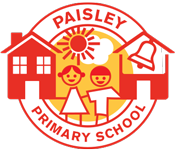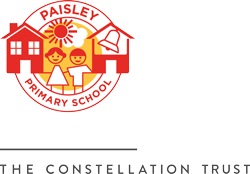

Intent
RE lessons at Paisley are intended to offer a broad and rich RE curriculum through the objectives of the exemplar units of the Locally Agreed Syllabus. The Locally Agreed Syllabus is structured into three statutory Areas of Understanding, which are consistent for each Key Stage. These include:
- Beliefs and Practices
- Identity and Values
- Meaning and Purpose
Each Area of Understanding incorporates two Attainment Targets:
AT1 Knowledge and Understanding or Learning about religion
AT2 Reflection and Response or Learning from religion
The lessons have an intention of providing a progressive experience, beginning with a key question to provoke questioning and an enquiry based approach to learning. Through each unit, children will know about and understand a range of religions and views and will be able to identify, investigate and respond to a variety of issues. Throughout the RE curriculum, cross curricular links will be made. SMSC, British Values and PHSE are implicit within the teaching of RE and ensure opportunities for children to develop positive attitudes and values and to reflect on and relate their learning in RE to their own experiences and the experiences of different faith families and communities. Such skills will develop knowledge and skills which will prepare them for life and work. Through this, children will be equipped with the knowledge, understanding and attitudes to encourage them to challenge themselves and work collaboratively with others; this will prepare them for their next stage of education.
By the end of Foundation Stage
Children will, through the Ages and Stages of Development and through the Early Learning Goals, show interest in the lives of people who are familiar to them. They will enjoy joining in with family customs and routines whilst knowing that children don’t always enjoy the same things and are sensitive to this. They know about similarities and differences between themselves and others and among families, communities and traditions. They will use speaking, listening and understanding to develop and explore these in greater detail linked to broad overarching topics. (This is delivered through the EYFS framework: Early Adopter version).
Key Stage 1
By the end of Key Stage 1 children will have looked at different places of worship and festivals, they will have explored artefacts and will have listened to different religious stories and be able to suggest morals to them. They will be able to ask and respond sensitively to the different beliefs and practices, including the clothing worn by members of faith families. The children will be able to express their opinions in different ways, including art, music or words and will also be able to respond sensitively to the similarities of different religions and give examples of co-operation in different religions.
Key Stage 2
By the end of Key Stage 2 children will have continued to develop their understanding of Christianity and Judaism as well as learning about Hinduism. They will be able to describe and make connections between different faiths including celebrations, worship and pilgrimages and reflect on the significance of taking part in rituals. They will be able to make links between stories, beliefs and practices and they will be able to respond thoughtfully to sacred writings and the teachings and practices of different faith communities. They will be able to give reasons for the significance of beliefs and be able to suggest why belonging to a faith community gives people a sense of belonging. The children will be able to reflect sensitively on the similarities and difference within and between different religions and world views as well as responding thoughtfully to ideas about community, values and respect. Also by the end of Key Stage 2 children will be able to identify how diverse communities live together for the wellbeing of all and respond thoughtfully to ideas about community, values and respect as well as discussing and applying their own ideas, which they can express clearly, about what is right and wrong and what is fair and just.
Implementation
RE is taught for 36 hours per year (equivalent 60 minutes per week) for KS1 and 45 hours per year (equivalent to 75 minutes per week in KS2)
At Paisley, the main faiths that children explore (although not exclusive) include, in Key Stage 1, Christianity and Judaism and in Key Stage 2, the children continue to develop their understanding of Christianity and Judaism as well as developing their understanding of Islam. Each key stage has its own specified statutory content for each faith. The key content specified builds on prior learning, is progressive and cumulative.
All children have access to the RE curriculum with work being tailored appropriately for children with SEND. Children will learn through similar activities, with final outcomes modified by the class teacher to suit all needs.
In RE, lesson objectives are structured and sequenced so that the final outcomes are secure and meaningful. Children do not learn objectives in isolation but continue to embed these through carefully planned application of skills throughout their time at Paisley.
Impact
The impact of Paisley’s RE curriculum will enable children to have a better understanding of the religions locally, nationally and worldwide and how they can learn from and work alongside each other. The RE curriculum will promote inquisitive minds, respect, tolerance and understanding for all those around them, including themselves. The evidence will be seen through the use of correct vocabulary, respectful opinions, spirited artwork, drama and reflections as well as pupil voice. The impact is measured through the Statutory End of Key Stage statements and is monitored through the use of FLIC which records attainment against year group objectives. As well as impacting on the pupils’ RE understanding, this subject also provides links with SMSC and British Values.
Spiritual
Respect and tolerance for different faiths. RE allows children to think about themselves and explore and be reflective about the beliefs of others.
Moral and social impact – respect others and the subject has a positive impact on the children’s participation and learning.
Cultural Pupils understand and respect diversity
As well as impacting on the SMSC the teaching of RE in the Paisley promotes
Further information
